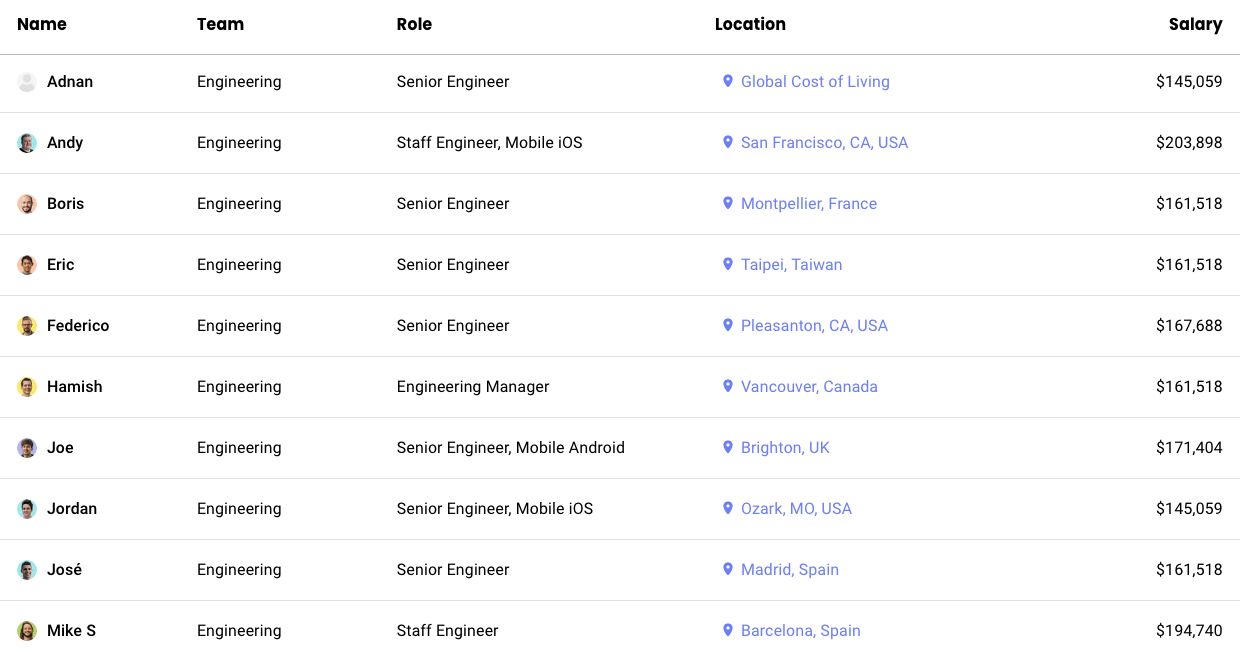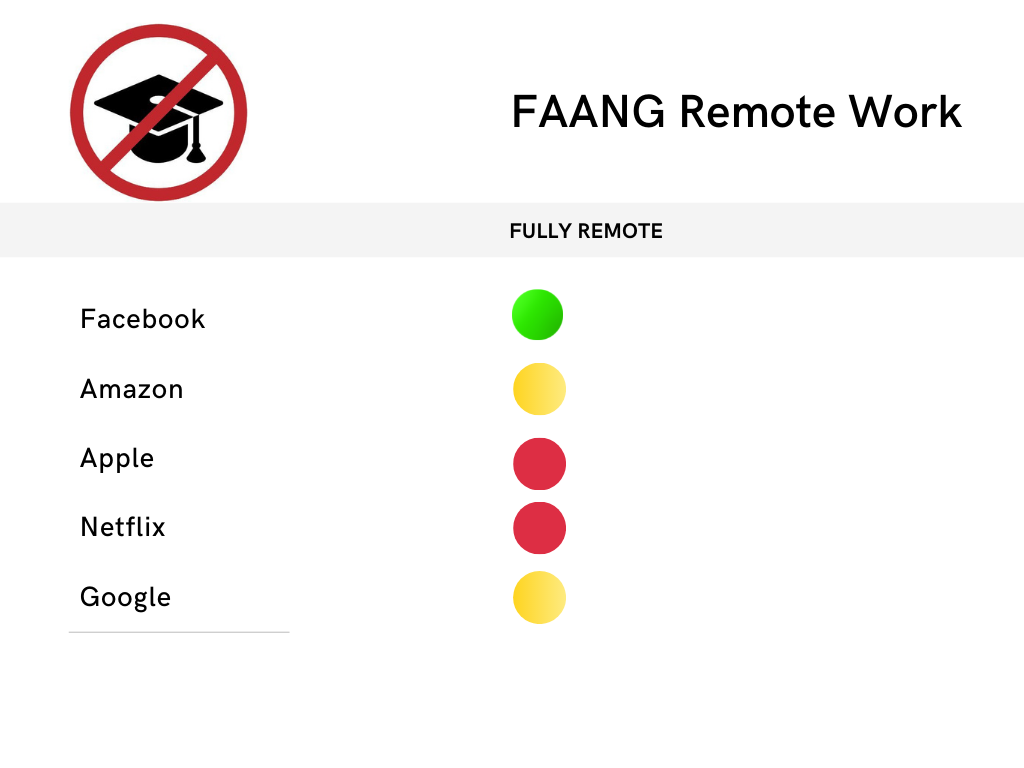Working remotely as a Software Engineer is an attractive option. It means saving time and money on a commute, more time with your friends and family and the ability to choose your work environment. This guide will go everything you need to know about working remotely as a Software Engineer.
What is a remote developer job?
A remote developer job is simply when you work as a Software Developer from home, a café, a co-working spot or any other place that is not your company's office.
Can I be a Software Engineer remotely?
One of the great perks of being a Software Engineer is the ability to work remotely. We can write code on our computers, push it to Github and collaborate with co-workers online. Apps like Zoom and Slack allow Software Engineers to have meetings and talk with each other. Provided you have a decent computer and a stable internet connection, you can work remotely as a Software Engineer.
What is it like to work remotely as a Software Developer?
Lots of Software Developers say they prefer remote work for a number of reasons. For example, self-taught developer and founder Kenneth Cassel is able to spend time with his three children by working home.
Another developer I've interviewed, Cyris, had this to say about working remotely as a developer:
"One of the reasons I wanted to be a developer was because I knew I would be able to work from anywhere in the world. I now work remotely 100% of the time and get to spend a lot more time with my wife and actually watching my son grow up alongside me. It has given me a lot of freedom, financial stability and a life I’m proud of."

Or you could start your own business and work remotely as a digital nomad like Pieter Levels. Lots of developers take advantage of remote work and travel the world.
Some developers find working from home isolating which is why finding a good co-working spot or a laptop-friendly cafe is a good idea if you are craving some human company.
What percent of software jobs are remote?
Around 80% of Software Engineer jobs are remote. While tech was already a big source of remote jobs prior to 2020, the Covid 19 pandemic undoubtedly led to more companies going remote. A study by the cloud hosting platform Digital Ocean found that a remote and flexible working environment was the 2nd biggest reason for a Software Engineer changing job or considering doing so.

Lots of companies now offer either fully-remote work or "hybrid-remote", where employees can spend part of the week working remotely but are expecting to come to the office as well.
Can you get hired remotely without a degree?
Yes! Josephine got hired as a remote Junior Software Engineer with video editing platform Veed. Josephine is a self-taught programmer who learned to code while travelling. She did an interview over Zoom with Veed to get her first developer job. Read about how she learned to code without a degree.

How do I become a remote developer?
After you have learned to code using online resources or attended a coding bootcamp, wrote your resumé and filled out your LinkedIn profile, you can start applying for remote jobs!
Be ready to have several rounds of interviews which may include an initial chat with a recruiter, a coding test you can do in your spare time and an interview with the CTO and/or CEO.
Remote salaries vs local salaries
Remote Software Engineer salaries tend to be higher than local salaries. In most cases, remote work has meant that salaries have increased up to the level of the biggest tech hubs in each country. For instance, a company based in San Francisco which offers remote work will usually pay the same salary no matter where you live in the US. This puts tech companies in smaller cities at a disadvantage as they struggle to pay higher wages.
In the past, a tech company in a small town or city could link salaries for Software Engineers to local pay levels. However, now they are competing for talent with companies in cities like San Francisco and New York City, which can usually afford to pay more.
In the UK, for example, London has always had the highest Software Developer salaries. Now that a lot of London-based companies have gone remote, a Software Developer in a city with lower salaries, like Glasgow, can now get paid at a London-level salary while living in a city with far lower living costs.
Do remote Software Engineers make less?
No - in most cases it's usual for Software Engineers to be paid more for remote jobs. This is because the job isn't anchored to living costs in the local economy. Also, tech companies competing for talented Software Engineers are willing to pay for the best people.
The rise of remote work has in many cases erased the idea of a local developer salary. Instead of being limited to looking for jobs in your city or even your country, you can now look for a remote job which will usually pay more.
For example, Ale was able to earn 15 times the local graduate salaries in her city in Mexico by finding a remote Software Engineer job.

How much does a remote Junior Software Engineer make?
Remote Software Engineers in the US usually earn between $70k and $90k, with FAANG companies paying more. Remote Web Developers in the UK can expect salaries of between £25,000 and £35,000. Higher salaries are possible, especially in London's lucrative banking sector.
Pay for junior developers depends often on where the company has it's base, with US employers offering higher wages than UK companies, generally speaking. However, some fully remote companies like Veed offer San Francisco-level salaries to all remote employees.
What is a remote Front End developer salary?
Remote Front End Software Engineers are paid a little less than Backend developers, generally speaking. A Software Engineer working on the front end can expect to earn around $88k at the lower end of the scale or up to $120k in some cases.
How much can you make as a remote Backend Developer?
Backend developers working remotely are typically paid around $100-150k. Traditionally, backend developers are paid more than front end developers due to more of a focus on logic rather than aesthetics.
What is a typical remote Full Stack Developer salary?
A Full Stack Software Engineer can expect to earn around $100k.
A remote Senior Software Engineer can make anything from $140k to $200k, base salary. Below is an image from the website of Buffer, a company that is transparent about employee salaries.

What companies are fully remote?
A lot of companies were already fully remote before Covid 19 hit. This means they had good systems in place and a culture based around trusting Software Engineer to work remotely. While some companies have gone back and forth over allowing remote work, here are some 100% fully remote companies that employ developers remotely.
Can Twitter Software Engineers work remotely?
Software Engineers at Twitter appear to have the best remote policy amongst the FAANG companies. Twitter CEO Parag Agrawal has signalled that employees are able to work remotely if they wish. However, as Elon Musk is in the process of acquiring Twitter, this remote-friendly policy may change in future as Mr Musk has ended remote work for many Tesla employees.
Does Facebook allow employees to work remotely?
Facebook/Meta allows Software Engineers to request remote work.
Does Amazon allow remote work?
Amazon has outlined a different remote work policy to other FAANG companies. It is letting directors of teams decide:
"For our corporate roles, instead of specifying that people work a baseline of three days a week in the office, we’re going to leave this decision up to individual teams. This decision will be made team by team at the Director level.
We expect that there will be teams that continue working mostly remotely, others that will work some combination of remotely and in the office, and still others that will decide customers are best served having the team work mostly in the office.
We’re intentionally not prescribing how many days or which days—this is for Directors to determine with their senior leaders and teams. The decisions should be guided by what will be most effective for our customers; and not surprisingly, we will all continue to be evaluated by how we deliver for customers, regardless of where the work is performed."

Does Apple allow remote working?
Apple has had a bumpy start to it's remote working policy after it's Director of Machine Learning in the Special Projects Group, Ian Goodfellow, resigned because the company would not allow him to work fully remotely:
"Here we are, the smart people that you hired, and we are telling you what to do: Please get out of our way, there is no one-size-fits-all solution, let us decide how we work best, and let us do the best work of our lives.”
Apple initially said employees could work remotely for two weeks of the year but the company has now increased this to four weeks. At present, Apple Software Engineers are able to work remotely two days a week and have to be present in the office three days a week. This has proved unpopular, with a lot of developers leaving the company in protest.
What is the Netflix remote working policy?
The Netflix CEO has been strongly against remote work, saying that it has no positives. As such, Netflix does not allow Software Engineers to work remotely.
Can Google Software Engineers work remote?
Software Engineers working at Google have been required to work 3 days a week in the office since April 2020. Previously, employees were able to work remotely due to Covid.
What is hybrid working?
Hybrid working is when employees are able to mix working remotely with working in the office. This is a compromise arrangement popular with many employers as it means they can retain the benefits of meeting in-person while allowing employees a degree of flexibility. Every company will approach hybrid working differently, with some expecting developers to spend most of the time in the office whereas others will require minimal time in-person time. Hybrid working may not suit some developers who want the full benefits of remote working.
Will remote work be permanent?
Despite opposition from some managers and founders, remote work looks to be a permanent feature of the working world. Software Engineering is perhaps uniquely placed to favour working remotely: code can be written on computers, employees can collaborate using software like Slack or Zoom and companies can digital payments from customers.
Unlike other industries which suffered hardship during Covid, most tech companies saw their stock values soar as they got more customers. Many tech companies have also slashed their costs by abandoning the office in favour of home working. Others have opted for a middle ground where they rent a space in a co-working office, which is a lot cheaper and more flexible than traditional office space.
A shortage of Software Engineers across the world gives employees an unusual amount of power in the modern world. Employees who enjoy remote work and have been told to return to offices are likely to be able to find a remote job with another company instead of compromising their lifestyle. So companies face a lot of pressure from in-demand Software Developers to allow remote working to continue.
In seems likely that remote work will become a permanent feature of working. In may be the case that some companies offer a degree of flexibility with a hybrid arrangement where developers work remotely part of the week while spending one or two days in the office per week.




